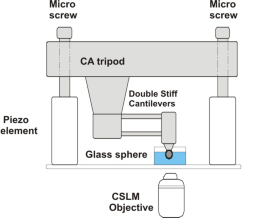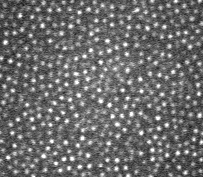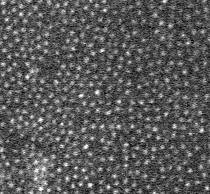Understanding the properties of liquids confined between solid surfaces is of fundamental importance to many technological problems like lubrication, adhesion and lithography. When a liquid is confined to small scales it behaves different from the bulk.
Confinement alters dynamics
Without confinement |
Confined sample |
Figure 1
It is known that dynamics of Hard sphere (HS) suspensions are governed by the volume fraction (VF): as the VF increases the system slows down. Since this can be directly visualized with a micros-cope, it can provide detailed information, that also sheds light on phenomena at the molecular scale such as the glass transition.
We studied how confinement affects the dynamics of a dense suspension of 1 µm particles in water-DMSO solvent. A confinement apparatus (Fig 2) was designed, utilizing a quasi-parallel sphere-plane geometry in which the gap can be precisely controlled. Real-time visualization is done with Confocal Scanning Laser Microscopy
Despite the fact the volume fraction essentially stays constant; the dynamics of HS suspensions dramatically slows down as the system is confined (Fig 1). Furthermore; our recent findings indicate that the dynamics is also affected by surface properties of confining substrates such as roughness. Understanding these effects can ultimately lead to fine tuning material properties such as glass transition temperature.

Figure 2
More information:
- contact: Burak Eral ,Michel Duits, Frieder Mugele


